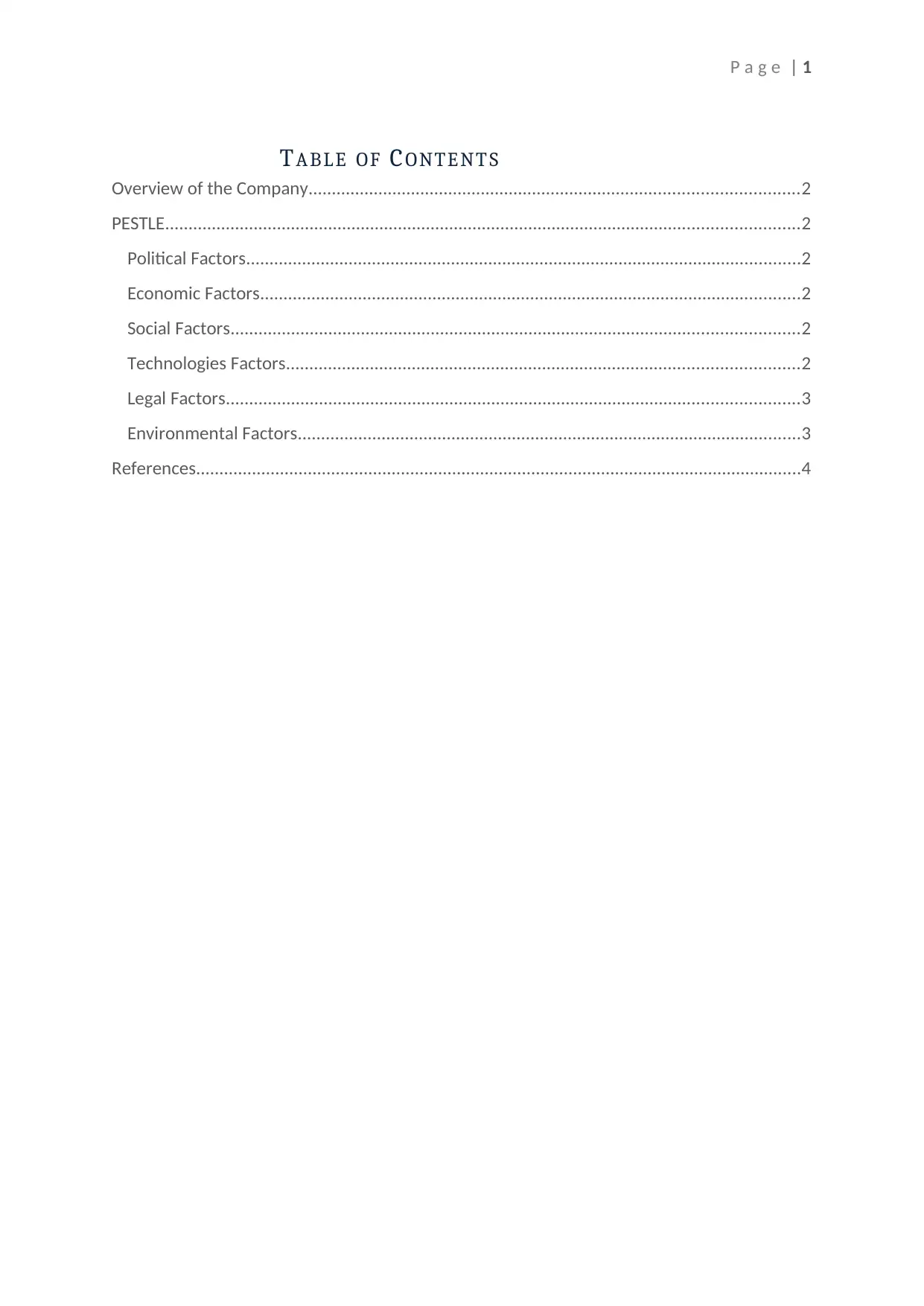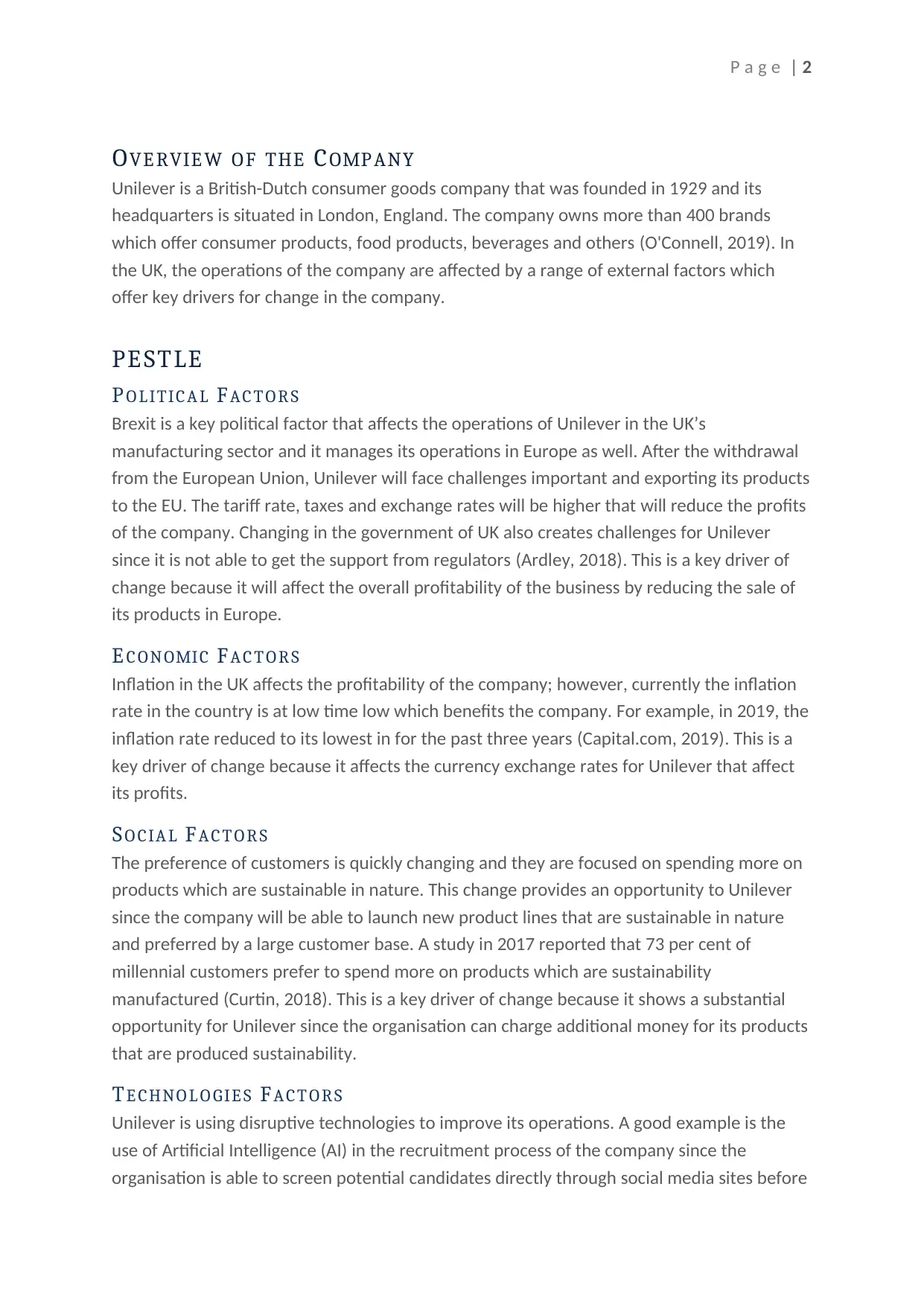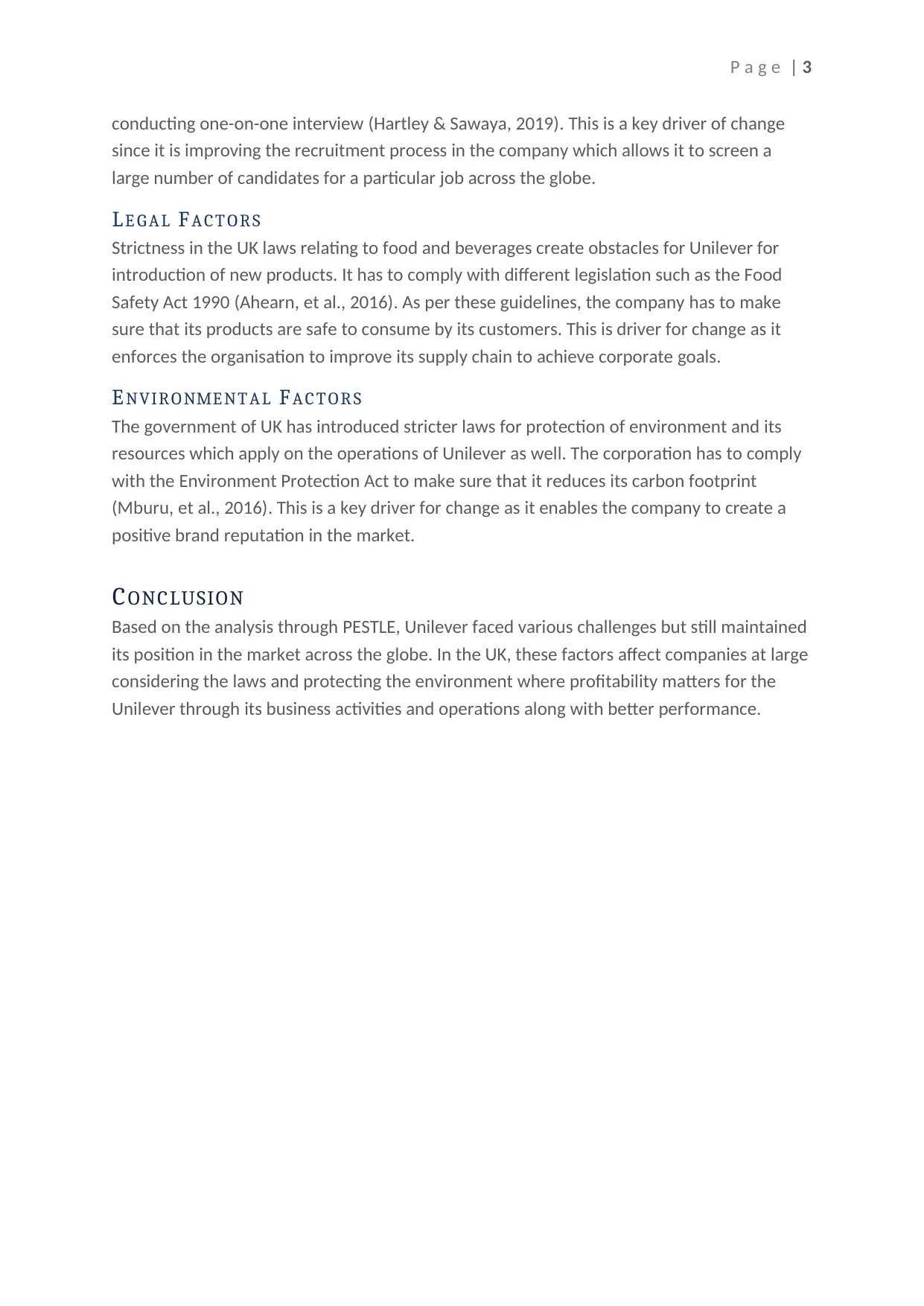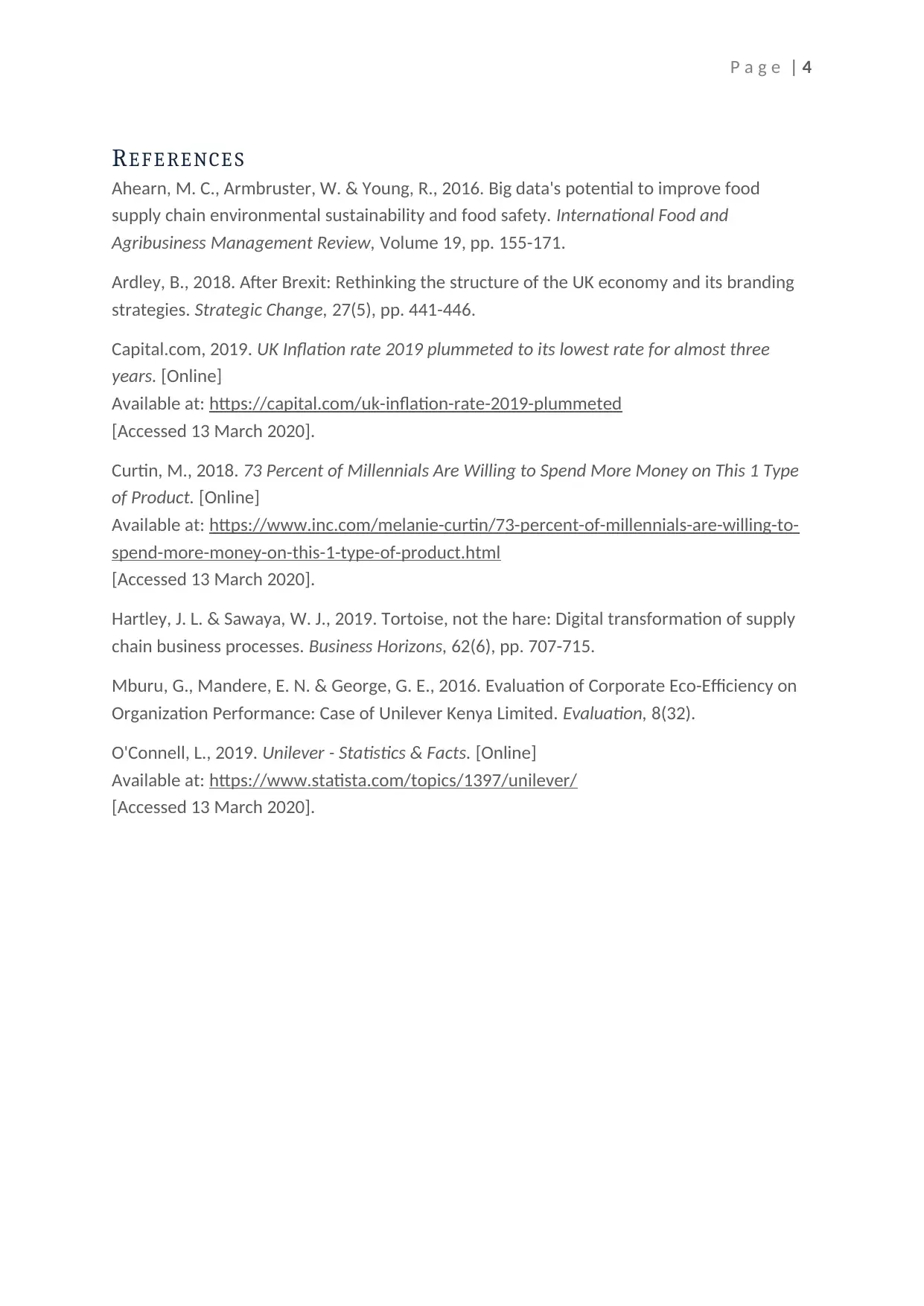Unilever's Global Business Environment: PESTLE Analysis and Impact
VerifiedAdded on 2022/08/21
|5
|1015
|13
Report
AI Summary
This report provides an analysis of Unilever's global business environment, focusing on the impact of various external factors in the UK. The report begins with an overview of Unilever, including its history, products, and recent developments. It then delves into a PESTLE analysis, examining the political, economic, social, technological, legal, and environmental factors affecting the company. The political factors discussed include the impact of Brexit and government regulations. Economic factors such as inflation and currency exchange rates are examined. Social factors focus on changing customer preferences for sustainable products. The report also analyzes the use of disruptive technologies like AI, the impact of UK laws on food and beverages, and environmental regulations. The conclusion summarizes the challenges and opportunities for Unilever in the UK market. The report utilizes references to support its analysis.

Global Business Environment
Student Name:
Student University:
Student Name:
Student University:
Paraphrase This Document
Need a fresh take? Get an instant paraphrase of this document with our AI Paraphraser

P a g e | 1
TABLE OF CONTENTS
Overview of the Company.........................................................................................................2
PESTLE........................................................................................................................................2
Political Factors.......................................................................................................................2
Economic Factors....................................................................................................................2
Social Factors..........................................................................................................................2
Technologies Factors..............................................................................................................2
Legal Factors...........................................................................................................................3
Environmental Factors............................................................................................................3
References..................................................................................................................................4
TABLE OF CONTENTS
Overview of the Company.........................................................................................................2
PESTLE........................................................................................................................................2
Political Factors.......................................................................................................................2
Economic Factors....................................................................................................................2
Social Factors..........................................................................................................................2
Technologies Factors..............................................................................................................2
Legal Factors...........................................................................................................................3
Environmental Factors............................................................................................................3
References..................................................................................................................................4

P a g e | 2
OVERVIEW OF THE COMPANY
Unilever is a British-Dutch consumer goods company that was founded in 1929 and its
headquarters is situated in London, England. The company owns more than 400 brands
which offer consumer products, food products, beverages and others (O'Connell, 2019). In
the UK, the operations of the company are affected by a range of external factors which
offer key drivers for change in the company.
PESTLE
POLITICAL FACTORS
Brexit is a key political factor that affects the operations of Unilever in the UK’s
manufacturing sector and it manages its operations in Europe as well. After the withdrawal
from the European Union, Unilever will face challenges important and exporting its products
to the EU. The tariff rate, taxes and exchange rates will be higher that will reduce the profits
of the company. Changing in the government of UK also creates challenges for Unilever
since it is not able to get the support from regulators (Ardley, 2018). This is a key driver of
change because it will affect the overall profitability of the business by reducing the sale of
its products in Europe.
ECONOMIC FACTORS
Inflation in the UK affects the profitability of the company; however, currently the inflation
rate in the country is at low time low which benefits the company. For example, in 2019, the
inflation rate reduced to its lowest in for the past three years (Capital.com, 2019). This is a
key driver of change because it affects the currency exchange rates for Unilever that affect
its profits.
SOCIAL FACTORS
The preference of customers is quickly changing and they are focused on spending more on
products which are sustainable in nature. This change provides an opportunity to Unilever
since the company will be able to launch new product lines that are sustainable in nature
and preferred by a large customer base. A study in 2017 reported that 73 per cent of
millennial customers prefer to spend more on products which are sustainability
manufactured (Curtin, 2018). This is a key driver of change because it shows a substantial
opportunity for Unilever since the organisation can charge additional money for its products
that are produced sustainability.
TECHNOLOGIES FACTORS
Unilever is using disruptive technologies to improve its operations. A good example is the
use of Artificial Intelligence (AI) in the recruitment process of the company since the
organisation is able to screen potential candidates directly through social media sites before
OVERVIEW OF THE COMPANY
Unilever is a British-Dutch consumer goods company that was founded in 1929 and its
headquarters is situated in London, England. The company owns more than 400 brands
which offer consumer products, food products, beverages and others (O'Connell, 2019). In
the UK, the operations of the company are affected by a range of external factors which
offer key drivers for change in the company.
PESTLE
POLITICAL FACTORS
Brexit is a key political factor that affects the operations of Unilever in the UK’s
manufacturing sector and it manages its operations in Europe as well. After the withdrawal
from the European Union, Unilever will face challenges important and exporting its products
to the EU. The tariff rate, taxes and exchange rates will be higher that will reduce the profits
of the company. Changing in the government of UK also creates challenges for Unilever
since it is not able to get the support from regulators (Ardley, 2018). This is a key driver of
change because it will affect the overall profitability of the business by reducing the sale of
its products in Europe.
ECONOMIC FACTORS
Inflation in the UK affects the profitability of the company; however, currently the inflation
rate in the country is at low time low which benefits the company. For example, in 2019, the
inflation rate reduced to its lowest in for the past three years (Capital.com, 2019). This is a
key driver of change because it affects the currency exchange rates for Unilever that affect
its profits.
SOCIAL FACTORS
The preference of customers is quickly changing and they are focused on spending more on
products which are sustainable in nature. This change provides an opportunity to Unilever
since the company will be able to launch new product lines that are sustainable in nature
and preferred by a large customer base. A study in 2017 reported that 73 per cent of
millennial customers prefer to spend more on products which are sustainability
manufactured (Curtin, 2018). This is a key driver of change because it shows a substantial
opportunity for Unilever since the organisation can charge additional money for its products
that are produced sustainability.
TECHNOLOGIES FACTORS
Unilever is using disruptive technologies to improve its operations. A good example is the
use of Artificial Intelligence (AI) in the recruitment process of the company since the
organisation is able to screen potential candidates directly through social media sites before
⊘ This is a preview!⊘
Do you want full access?
Subscribe today to unlock all pages.

Trusted by 1+ million students worldwide

P a g e | 3
conducting one-on-one interview (Hartley & Sawaya, 2019). This is a key driver of change
since it is improving the recruitment process in the company which allows it to screen a
large number of candidates for a particular job across the globe.
LEGAL FACTORS
Strictness in the UK laws relating to food and beverages create obstacles for Unilever for
introduction of new products. It has to comply with different legislation such as the Food
Safety Act 1990 (Ahearn, et al., 2016). As per these guidelines, the company has to make
sure that its products are safe to consume by its customers. This is driver for change as it
enforces the organisation to improve its supply chain to achieve corporate goals.
ENVIRONMENTAL FACTORS
The government of UK has introduced stricter laws for protection of environment and its
resources which apply on the operations of Unilever as well. The corporation has to comply
with the Environment Protection Act to make sure that it reduces its carbon footprint
(Mburu, et al., 2016). This is a key driver for change as it enables the company to create a
positive brand reputation in the market.
CONCLUSION
Based on the analysis through PESTLE, Unilever faced various challenges but still maintained
its position in the market across the globe. In the UK, these factors affect companies at large
considering the laws and protecting the environment where profitability matters for the
Unilever through its business activities and operations along with better performance.
conducting one-on-one interview (Hartley & Sawaya, 2019). This is a key driver of change
since it is improving the recruitment process in the company which allows it to screen a
large number of candidates for a particular job across the globe.
LEGAL FACTORS
Strictness in the UK laws relating to food and beverages create obstacles for Unilever for
introduction of new products. It has to comply with different legislation such as the Food
Safety Act 1990 (Ahearn, et al., 2016). As per these guidelines, the company has to make
sure that its products are safe to consume by its customers. This is driver for change as it
enforces the organisation to improve its supply chain to achieve corporate goals.
ENVIRONMENTAL FACTORS
The government of UK has introduced stricter laws for protection of environment and its
resources which apply on the operations of Unilever as well. The corporation has to comply
with the Environment Protection Act to make sure that it reduces its carbon footprint
(Mburu, et al., 2016). This is a key driver for change as it enables the company to create a
positive brand reputation in the market.
CONCLUSION
Based on the analysis through PESTLE, Unilever faced various challenges but still maintained
its position in the market across the globe. In the UK, these factors affect companies at large
considering the laws and protecting the environment where profitability matters for the
Unilever through its business activities and operations along with better performance.
Paraphrase This Document
Need a fresh take? Get an instant paraphrase of this document with our AI Paraphraser

P a g e | 4
REFERENCES
Ahearn, M. C., Armbruster, W. & Young, R., 2016. Big data's potential to improve food
supply chain environmental sustainability and food safety. International Food and
Agribusiness Management Review, Volume 19, pp. 155-171.
Ardley, B., 2018. After Brexit: Rethinking the structure of the UK economy and its branding
strategies. Strategic Change, 27(5), pp. 441-446.
Capital.com, 2019. UK Inflation rate 2019 plummeted to its lowest rate for almost three
years. [Online]
Available at: https://capital.com/uk-inflation-rate-2019-plummeted
[Accessed 13 March 2020].
Curtin, M., 2018. 73 Percent of Millennials Are Willing to Spend More Money on This 1 Type
of Product. [Online]
Available at: https://www.inc.com/melanie-curtin/73-percent-of-millennials-are-willing-to-
spend-more-money-on-this-1-type-of-product.html
[Accessed 13 March 2020].
Hartley, J. L. & Sawaya, W. J., 2019. Tortoise, not the hare: Digital transformation of supply
chain business processes. Business Horizons, 62(6), pp. 707-715.
Mburu, G., Mandere, E. N. & George, G. E., 2016. Evaluation of Corporate Eco-Efficiency on
Organization Performance: Case of Unilever Kenya Limited. Evaluation, 8(32).
O'Connell, L., 2019. Unilever - Statistics & Facts. [Online]
Available at: https://www.statista.com/topics/1397/unilever/
[Accessed 13 March 2020].
REFERENCES
Ahearn, M. C., Armbruster, W. & Young, R., 2016. Big data's potential to improve food
supply chain environmental sustainability and food safety. International Food and
Agribusiness Management Review, Volume 19, pp. 155-171.
Ardley, B., 2018. After Brexit: Rethinking the structure of the UK economy and its branding
strategies. Strategic Change, 27(5), pp. 441-446.
Capital.com, 2019. UK Inflation rate 2019 plummeted to its lowest rate for almost three
years. [Online]
Available at: https://capital.com/uk-inflation-rate-2019-plummeted
[Accessed 13 March 2020].
Curtin, M., 2018. 73 Percent of Millennials Are Willing to Spend More Money on This 1 Type
of Product. [Online]
Available at: https://www.inc.com/melanie-curtin/73-percent-of-millennials-are-willing-to-
spend-more-money-on-this-1-type-of-product.html
[Accessed 13 March 2020].
Hartley, J. L. & Sawaya, W. J., 2019. Tortoise, not the hare: Digital transformation of supply
chain business processes. Business Horizons, 62(6), pp. 707-715.
Mburu, G., Mandere, E. N. & George, G. E., 2016. Evaluation of Corporate Eco-Efficiency on
Organization Performance: Case of Unilever Kenya Limited. Evaluation, 8(32).
O'Connell, L., 2019. Unilever - Statistics & Facts. [Online]
Available at: https://www.statista.com/topics/1397/unilever/
[Accessed 13 March 2020].
1 out of 5
Related Documents
Your All-in-One AI-Powered Toolkit for Academic Success.
+13062052269
info@desklib.com
Available 24*7 on WhatsApp / Email
![[object Object]](/_next/static/media/star-bottom.7253800d.svg)
Unlock your academic potential
Copyright © 2020–2026 A2Z Services. All Rights Reserved. Developed and managed by ZUCOL.




